Every screenwriter needs advice. Put simply, a career won’t progress without listening and taking heed of the right advice. Writers advice can be easy to find. But great advice, well that’s a slightly different kettle of fish.
With an ever-growing pool of aspiring screenwriters comes a seemingly endless supply of writers advice. Reviewing their credentials and weighing up the pros and cons can be a time-consuming exercise. And all this before you’ve even begun sifting through the gems that could invigorate your next script.
Do you turn to the innumerable books on screenwriting and storytelling? Search and scroll your way through Youtube? Or take a chance on an online course? Well, before you do, we’ve gathered 50 pieces of advice from some of the best modern screenwriters that’ll refine your writing and help you stand out.
We’ll look at:
- The Writer’s Mindset.
- How Writers Handle Failure.
- Discipline in Writing.
- How Writers Find Their Voice.
- How to Find Method in Writing.
- Do Writers Steal From Each Other?
- Writing Great Characters.
- Finding Writing Inspiration.
- How Writers Keep Motivated.
A Mindset
As many screenwriters offering advice will attest to, getting in the right mindset to begin is the first step. But before a blank page, comes the niggling self-doubt or perhaps the idea that in the pursuit of perfection a writer isn’t quite ready.
“It took me a good number of years before I put the words on paper because I was worried if it turned out I couldn’t write. I think this is something women do more than men, but definitely self-doubt and this desire to judge yourself before you even start and to think there’s only one way to do when in fact, the best stuff is done by people who don’t have any idea how you’re supposed to do it and are following their own instincts and taking risks.” — Naomi Foner
And then that blank page rears its head. So what should a writer aim to foster?
“Endless patience, commitment and not being scared of the blank page.” – Armando Iannucci
Writer’s block is an infamous ailment of the screenwriter. More often than not writers advice on how to tackle this usually takes the shape of removing yourself from your writing and returning to it later. But above all else, the prevalence of advice on writer’s block simply highlights how it’s a natural state that punctuates the flow of writing.
“I am in a constant state of writer’s block. That is my default position.” – Aaron Sorkin.
All writers learn to embrace solitude as a necessity of the writing process, a time to focus on nothing else. However, being in your head for a prolonged period of time can prove detrimental. It could limit the level of objectivity you have when approaching your work.
“When you are writing all by yourself and you are falling into the trap of being so obsessed with your own work and being so stubborn about what you are writing, and you’re following only that single path, and you end up to go into all this self-contentment and go into self-praise of what you’ve done, become so proud of what you’ve done, that is something you should really be conscious against.” – Park Chan-Wook
Once these challenges have been managed, it’s always important to stay grounded and committed when seeking success as a writer. A good work ethic throughout your career is a must.
“Laziness is something I really can’t tolerate because laziness speaks at a sense of entitlement. That’s just not a good look in this industry, where you think that you’re entitled to something… you think you deserve something… because you’re wherever you think you are. It doesn’t work like that.” – Spike Lee
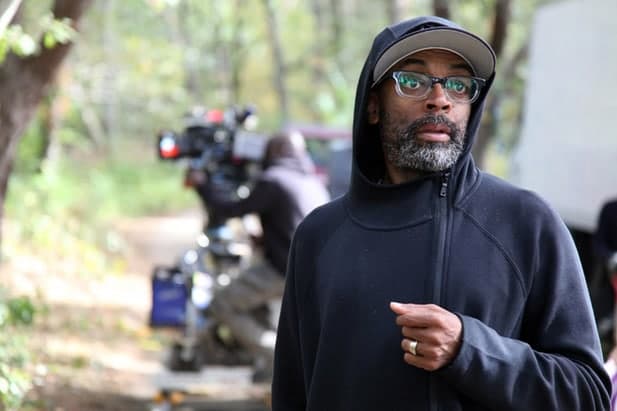
Writers Advice on Coming to Terms with Failure
Everyone makes mistakes. And certainly, all writers encounter failure. It can be a hard concept to swallow when you’re imagining your career progression or staring a new project in the face. But learning to accept failure is one of the most important aspects of growing as a writer and an artist, as these pieces of writers advice demonstrate.
“Here is a secret I’ve learned in 20 years as a screenwriter: failure is constant. And I mean it. Everybody fails at it all the time. Not just screenwriters. But I think anybody who has tried to illuminate the human experience in an authentic way.” – Susannah Grant
“Oh my goodness—I made so many mistakes! I still cringe at certain lines in the movie. The fact is, when I wrote Juno—and I think this is part of its charm and appeal—I didn’t know how to write a movie. And I also had no idea it was going to get made! It was really just a hypothetical in every way.”– Diablo Cody
When it comes to making mistakes, writers advice will typically encourage you to embrace the inevitability of mistakes and failure. Failure is an essential part of the screenwriting journey and writers advice from hugely successful writers proves that failure didn’t stop them and was key to their story, as hard as it might be to believe when they’re clutching an Oscar or penning a masterpiece.
“If you can’t fail, you can’t do this job” – Emma Thompson
It can be easy to associate failure with a finished script where no one picks it up, the result isn’t what you’d envisioned, or it isn’t well received. A writer can realise during the writing process that it’s not taking shape in the desired way or the words just aren’t coming. In this case, move on.
“And what begins to happen as you tell your story repeatedly and re-outline it… One is you get sick of the story, it dies, it withers and you walk away. This is a very good thing. It means you have just saved yourself six months writing a story nobody wants to read or make.” – Paul Schrader
Making mistakes and experiencing failure need not be a bad thing at all. The idea is always particularly terrifying at first, but coming to terms with it can be completely liberating.
“It’s so freeing, it’s beautiful in a way, to have a great failure, there’s nowhere to go but up.” – David Lynch
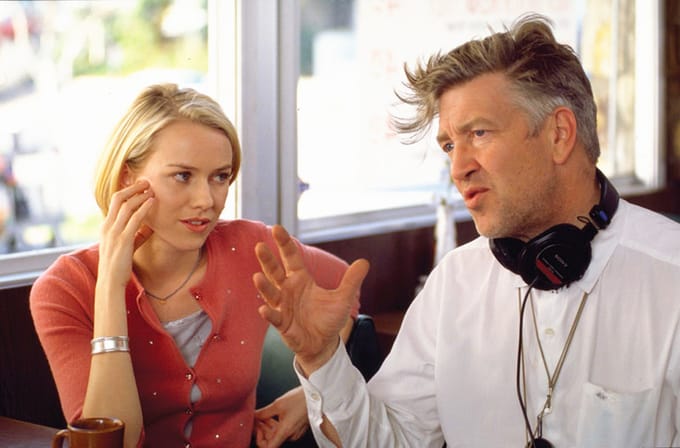
A Dose of Discipline.
Discipline is a necessity for any writer and, like the mistakes, something that’s all too easy to overlook when taking advice from those who’ve seen success. But herein lies the key to that success, the daily hours. The time spent as an unknown honing their craft.
“I try to do it at least five hours every day… It takes a minute to get in the zone, and when I’m in it, I like to stay there and not be interrupted. I try not to check emails, I don’t have conversations, I don’t listen to music. My family knows when not to talk to me.” – Kasi Lemmons
It isn’t as if the only thing a screenwriter should do with their free time is write. Sometimes it can help to just take yourself away from a script for a day and return with a fresh perspective.
“When I have to, I’ll work on one [project] in the morning, and one in the afternoon, or I’ll work on each on alternate days or weeks. It can be good because you get to move away from stuff and come back to it a little bit fresh.” – Amy Holden Jones
While keeping up a general good routine is certainly crucial, what happens when you’re in the midst of a project? Here, writers advice prescribes a great deal of dedication but often for slightly different reasons. Namely, to stay true to the psychology of your characters.
“Once I’m in the writing phase of something, I do try to write something every day, seven days a week, even if it’s terrible. I think it’s important to stay in the world of the characters. It’s more about once you enter that space, you gotta just stay in it.” – Barry Jenkins
A lot of writers advice tends to stress the difficulty of starting a project, but it is more often the challenge of finishing one that proves a struggle. And then once you’ve reached the end, comes the brutal process of the rewrites where the time comes to kill your darlings.
“To be a screenwriter first you have to write. And then you have to finish what you write. It seems obvious, but it’s not” – Javier Gullón
“To write is to rewrite.” – Kenya Barris

Writers Advice on Finding Your Voice
It’s your voice and perspective as a screenwriter that’ll distinguish you from your peers. Alongside a healthy supply of discipline and commitment, what does writers advice from some of the industry’s most successful suggest for discovering your voice and then perfecting it as a mode of expression?
“Write your voice, write how you talk, write how you think. What’s really inside you? Because if there’s anything that executives are looking for it’s something fresh, original, and authentic.” -Jac Shaeffer
“Your specifics are probably more interesting than a lot of the things you might fabricate. Look, there are great stories that are pure imagination. But also, talk to people. Your Uber driver or your Postmates dude or whoever, just talk to them. Where did they grow up? Or what were their parents like? Or were they religious? Were they poor growing up? Were they well off? All of those specific details can be really fascinating.” – Alan Yang
If seeking inspiration on how to express yourself through your voice, you need look no further than the industry itself. Identifying the current zeitgeist can serve to inform a writer on what differentiates their writing from what’s being made at the moment or what’s always been made.
“One of the good things about being a female filmmaker is that you get to put things on screen that haven’t been seen, because no one has had a chance to show them yet. So instead of thinking of it as a negative, you can flip it and think of it like there aren’t enough movies by women, so whatever I write, the things that I’m interested in, are different, therefore novel and therefore valuable.” – Tamara Jenkins
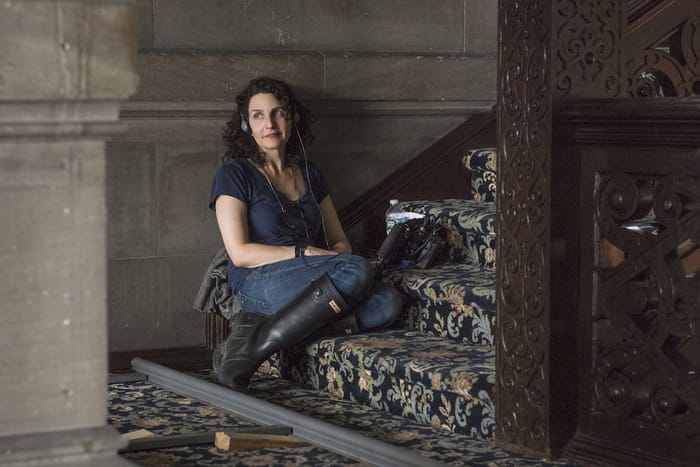
“Reading great screenplays will teach you which rules to break, and reading not so great screenplays will teach you which rules not to break. Once you’ve gotten a little barometer for that, be absolutely reckless in the pursuit of your vision.” – Elizabeth Chomko
Incorporating or considering writers advice is certainly worthwhile but as some screenwriters point out what makes your story unique is you. And being judicious with the advice you take when telling your own story is vital.
“Don’t let anyone tell you what a story is, what it needs to include or what form it must take.” – Charlie Kaufman
A Method Behind the Madness
What works for one writer may not work for another. Throughout their careers, screenwriters develop their own habits and approaches that best suit them. These pearls of writers advice are specific to screenwriting itself and therefore serve to illuminate what defines the discipline in contrast to other forms of writing.
“Screenwriting is not real writing. It’s not. You’re not writing a book. You’re writing the basics, the situation, where they are and what they’re doing should really say everything. And leave room for actors to do something… Good writing belongs in books. Screenwriting should be absolutely as economic as possible so that the filmmaking can take over.” – Paul Thomas Anderson
It can often be all too tempting to become a bit of a perfectionist over a script. But if your fortunate enough to be involved with a project from pre to post-production, it’s worth remembering that your writing will inevitably change across this process. Something worth bearing in mind even when writing for spec.
“They say you rewrite a film in three steps. You write the script, and then you write it again when you’re producing it and shooting it, and you write it again in post-production. I really love the process of these layers; of ways you can build upon themes that you created or completely shift the story in a different direction in post-production just based on what music you use or how you might utilize voiceover.” – Lulu Wang
Writers advice can also stress the importance of recognising the collaborative nature of the art form. And so, starting with this in mind a writer can often find the thematic core of the work through others.
“I’ve always approached writing as what’s the idea in here? Emotionally and thematically, what are we trying to say?… It’s always the director I’m trying to dig that out of. I’m also trying to make sure that it’s so human that I can also write that. ‘Cause we’ve gone so deep down into what their idea is that it’s hit the human condition.” – Meg LeFauve
A writing partner takes this idea to the next level. And it works for many of the industry’s best as it develops their ideas in ways they would otherwise be blind to.
“I work very closely with Efthymis; we write the scripts together, and it’s mostly a dialogue. We start discussing a situation, one says one thing, one says another thing, and it just progresses around ideas we’re interested in.” – Yorgos Lanthimos
Meanwhile, for some writers, it’s a matter of striking up the right mood through music.
“I spend a lot of time making a playlist. I listen to a playlist when I write.” – Taika Waititi
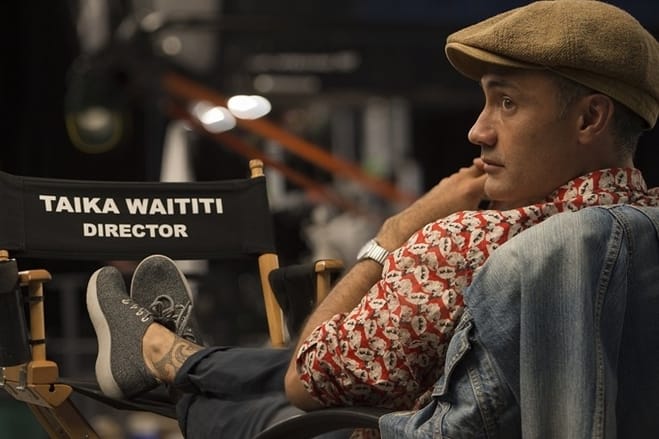
Method in the Process
Lessons in screenwriting will frequently emphasise the need to establish an intention and an obstacle to create conflict. This kind of teaching is common across writers advice as it tends to form the foundation for all dramatic tension in a script.
“There’s no story if there isn’t some conflict. The memorable things are usually not how pulled together everybody is. I think everybody feels lonely and trapped sometimes. I would think it’s more or less the norm.” –Wes Anderson
The three or, if you’re feeling particularly Shakespearean, the five-act structure, is likely something all screenwriters have encountered. For some, they provide loose guidelines that help the pacing of a script.
“I’m a stickler for structure. So I tend to make sure I’m hitting certain points in the script and that I’m progressing and moving things along. You know, are the characters keeping the plot moving along? And are they true and do I know their motivations?” – Allison Schroeder
Though some writers feel it’s best not to focus too much on structure and pay attention to a good story simply told. Or to eschew the format altogether in favour of a more free-flowing model.
“My only conclusion about structure is that nothing works if you don’t have interesting characters and a good story to tell.” – Harold Ramis
“People have forgotten how to tell a story. Stories don’t have a middle or an end any more. They usually have a beginning that never stops beginning” – Steven Spielberg
Storyboarding or similar visual techniques are often employed by writers to better imagine what it is they’re writing. The writing can then take a more descriptive shape as the images are already realised.
“I visualize as I’m writing. I compile books of photos of all the characters and where they live or what they do, and then I’m really trying to visualize all those things. It doesn’t mean I’m neglecting their character development, but I’m trying to write a film that would hold up without sound.” – Tom Ford
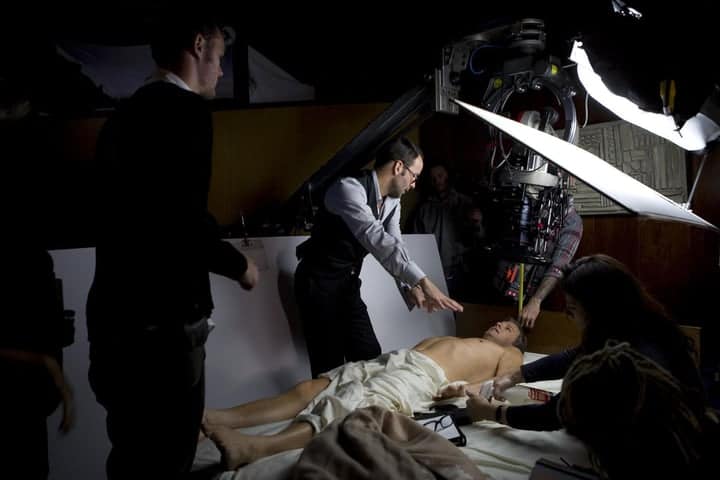
Good Writers Borrow…
While any screenwriter would want to avoid their work becoming derivative, some of the greatest know that borrowing and even stealing from their favourite writers is bound to happen. So, according to these nuggets of writers advice, why not embrace it?
“I want to go back to Stepford Wives and Rosemary’s Baby… for me, those movies were both extremely inspiring because what they did within the thriller genre was this very delicate tightrope walk that honored the protagonist in a way that you rarely see in the genre these days. The characters in those movies, the protagonists, are smart. They’re investigative. And they’re on the trail.” – Jordan Peele
To take this concept further, inspiration can be found not only from your favourite films, books, or screenplays but anywhere in life. Knowing this can breathe life into your characters as you begin to recognise and understand them better.
“Always steal from life! From what you know and see, it’s the best way. When you can say ‘Oh, I know that character, yes!’, it all kind of clicks into place and characters bounce off the pages” – Jesse Armstrong
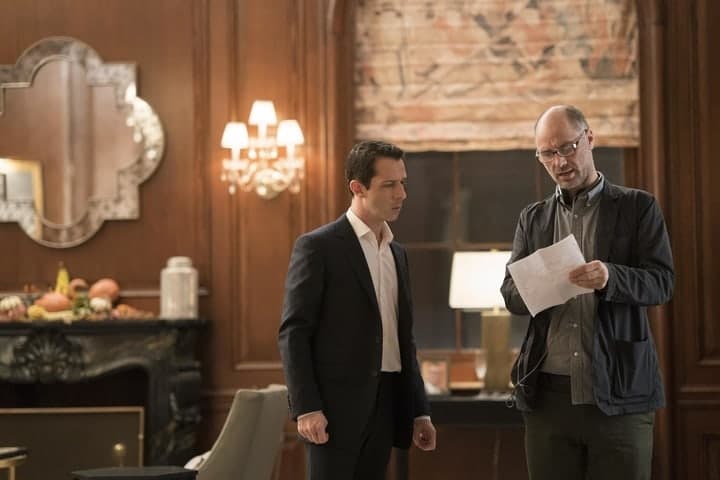
“I often use real names in my scripts of people I know. Not because I’m writing about them at all, I would never do that, but because it’s immediately a real person to me, I believe it.” – Noah Baumbach
The writers’ maxim ‘write what you know’ can be somewhat restrictive if taken too literally to mean write about events from your life. But drawing from your own experience, whether it be an emotion or an opinion, and applying it in your writing may just lend it some authenticity and honesty.
“I don’t know how to tell stories unless I’ve lived them, unless I’ve eaten them, unless I’ve partied with them. Who can make this shit up? You can’t make this shit up!” – Lee Daniels
As this very article aims to illustrate, drawing from the thoughts of a favourite artist can meaningfully inform your work.
“Hitchcock said himself that a murder that happens inside, rather than a murder that happens in the back alleyway under the rain, a murder that happens under broad daylight during the day is always more fascinating and that’s kind of been the motto of my career when I’m writing a script or shooting my film. That quote is always hovering inside my brain.” – Bong Joon-Ho
Love Your Characters, All of Them
For many screenwriters, the writing process revolves around compelling characters interacting. And within a script, it is often the dialogue that takes centre stage. Therefore, writers advice commonly mentions learning to sit and empathise with your characters to imbue them with nuance and depth.
“Let your characters talk to each other and do things. Spend time with them – they‘ll tell you who they are and what they’re up to.” – Greta Gerwig

“You kind of have to love all your characters. You have to see all of their faults truthfully, but all of their hopes truthfully, too.” – Martin McDonagh
“Love all your characters, even the ridiculous ones. You have to on some level; they’re your weird creations in some kind of way.” –Joel Coen
This is just as important when writing in a time that isn’t your own. It can be all too easy for anachronisms to begin to occur but in the same breath, the characters need to resonate with a modern audience. And so it can prove a difficult balancing act.
“But even still, when you’re getting into this other world, you can’t be judgmental of the characters and the time period, you can’t rewrite history to conform to the zeitgeist, but you do have a responsibility to understand what’s going on today and not be foolhardy.” – Robert Eggers
Even good screenplays can fall foul of overly sympathising with the protagonist(s) to the detriment of other characters. Your antagonists need a little bit of love too.
“The thing is, when you paint somebody in all of their colors, they’re never all bad or all good. Even the worst person has humanity in there somewhere.” –Terence Winter
A Spark of Inspiration
At the initial stages of writing it can be difficult to come up with that all-important concept or scenario that leads to strings of scenes. Writers advice on inspiration can take all kinds of forms, some suggest looking at more abstract ideas like themes, while others note that all it takes is a simple image.
“As far as I’m concerned, all you really need is a story, with two or three interesting characters, interestingly entangled in an interesting space. You also need some transcendent idea, emotion or urge to carry you through the whole process. The reason why you are doing it in the first place.” – Pawel Pawlikowski

“I had this image of a girl pissing in a living room on the carpet and I thought ‘god, why’s she pissing in someone’s living room?” It wasn’t hers. It wasn’t where she lived. And I thought ‘wow – why is she pissing in someone’s living room?” — Andrea Arnold
Waiting for inspiration could prove to be a bit of a waste of time. Getting into the habit of writing will usually serve you better. Particularly when that spark can come from anywhere. Just have a notebook nearby.
“Inspiration can hit you in the head at any time in any context. It could happen in a conversation. Talking to someone at a party, you can get an idea. But you’ve got to remember those inspirations.” – James Cameron
Research may not bring to mind the artist frantically making their vision a reality. But it is key if you want to immerse your audience in the world you’ve created. Even more so if you’re writing happens to be a historical piece or one based on actual events (however loosely). Before the writing has properly begun it is here that many writers find the script takes shape.
“I think that this sensation of reality, the sense that she isn’t a symbol, comes both from this serious work of research, and from this intimacy I have with the work, with being a female artist.” – Celine Sciamma
If struggling for inspiration or questioning your writing, try not to worry too much about the practicalities of filmmaking.
“If it can be written or thought, it can be filmed.” – Stanley Kubrick
Motivation
Let’s not kid ourselves, becoming a professional writer is difficult and the romanticised idea of a writer born with innate ability is almost always far from the truth. Before recognition, many writers emphasise how writing existed as a passion, a need to write for no one other than themselves.
“If you really want to make art for a living, that can be a challenge. I say that you really have to find the way for that art to make you happy without it or you necessarily being celebrated.” – Tarell McCraney

“If you’re writing every day, then you’re a writer. You may not be a working writer, but you are a writer. And if you’re not writing every day, and you tell me that writing is your passion and is who you are and who you want to be, you have to examine why you’re not writing every day… maybe you just like the idea.” – Shonda Rhimes
Just finding joy in writing and a willingness to take risks with a screenplay can make all the difference.
“I don’t think technically when I’m writing, that’s the joy of writing, you’re not constrained by technique. The sky’s the limit when you’re writing so it’s fantastic.” – Alfonso Cuarón
Closing Thoughts
A closing caveat that’s worth bearing in mind is that success can seem like a well-trodden path, like there’s a formula to follow. But in truth, these pieces of writers advice have shown how there are myriad ways in which to achieve it, surely as many as there are writers.
“This is what I have taught myself, and the only way to teach something as fungible as screenwriting is to teach what has worked for you.’ Because there’s no way you can teach what works for everybody.” -Paul Schrader
And if you ever find yourself struggling for purpose…
“Say who you are, really say it in your life and in your work. Tell someone out there who is lost, someone not yet born, someone who won’t be born for 500 years. Your writing will be a record of your time, it can’t help but be. But more importantly, if you’re honest about who you are, you’ll help that person be less lonely in their world. Because that person will recognize him or herself in you, and that will give them hope.” – Charlie Kaufman
In Summary:
It’s always important to stay grounded and committed when seeking success as a writer. A good work ethic throughout your career is a must. Don’t be complacent and make sure you’re always giving yourself a hard time.
Failure is the most inevitable part of being a writer. Learning how to swallow it well is as vital a skill as any other in writing. Embrace, accept and keep going.
Don’t be too kind on yourself and don’t be precious about your work. Remember commitment to the project at hand and don’t allow yourself to slack at any part of the process.
Search inside you and search around you. Don’t let other people tell you what to write and try to search for authenticity by connecting to the story you choose to tell.
Yes, absolutely. Be a magpie, flitting between all forms of art and picking up shiny inspiration where you can. Furthermore, steal from real life too. The world and people around you can often be the greatest inspiration of all.
Empathise with your characters to imbue them with nuance and depth. Try and think of and embrace all aspects of them in order to make them as fully rounded as possible.
Some writers suggest looking at more abstract ideas like themes, while others note that all it takes is a simple image. Whether it be in-depth research or one random striking image, let your imagination lead you first, with a practical sense of what will work and what won’t following behind.
Put simply, if you don’t enjoy the process of writing it’s perhaps not the job for you. Pursuing a writing career can be a slog but if you’re passionate about the actuality of doing it, then you’re always gaining something along the way.
- What did you think of this article? Share It, Like It, and let us know your thoughts in the comments box further down…
- Struggling with a script or book? Story analysis is what we do, all day, every day… check out our range of script coverage services for writers & filmmakers.
This article was written by Oliver Hardman and edited by IS Staff.
Get *ALL* our FREE Resources
Tackle the trickiest areas of screenwriting with our exclusive eBooks. Get all our FREE resources when you join 60,000 filmmakers on our mailing list!

